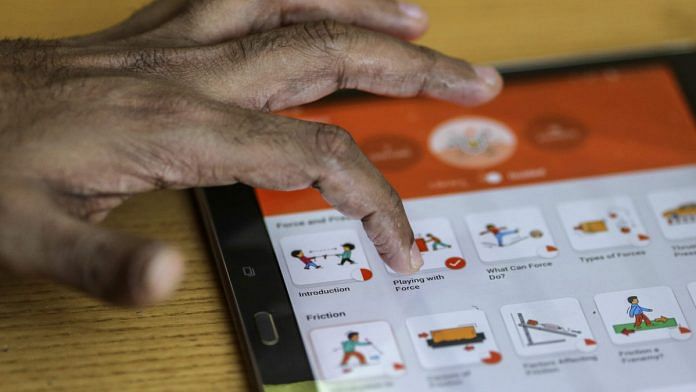It takes a village to raise a child. Education is much too important to be handed over to online learning; a child’s development requires access to many different people, learning approaches, and pursuits. With 1.2 billion children out of the classroom due to the coronavirus pandemic, online learning is being viewed as the magical solution. Far from it – it is a supplement, not a saviour. In the coronavirus world, we must redouble our efforts to provide human-centric learning to our children.
Also read: Covid pandemic has given the world a great online learning experiment
The best learning is physical, not virtual
The purpose of education is to prepare young people to lead successful lives as productive and engaged citizens. Young people need to be able to find good and satisfying work as well as understand the major issues that impact their lives. Online learning may help in developing basic skills, but it does not help in building the curiosity, critical thinking, and emotional intelligence that is necessary for being a high-functioning adult in the 21st century.
Much of learning is motivated play. Children are inherently curious – they want to know and understand their world. Good early childhood education provides the environment to play, explore, and learn. Exploration should be tactile, so that children can start to develop conceptual models of the world in their mind and begin to process it so that they can develop new skills. The best engineers start by playing with blocks and then graduate on to more complex building kits. By definition, the virtual world cannot provide this kind of physical stimulation.
Curiosity builds as we experience the physical world around us. Why is the sky blue? Why are there so many twinkling stars at night? Where do mangos come from? These are the questions that children must be allowed to ask and explore. Teachers and parents have to be there to guide this exploration and further stimulate curiosity. As children begin to understand how the world actually works, they begin a lifelong quest to learn more broadly, engage more deeply.
Also read: Students retain more in online classrooms, shows data
Emotional development is essential
Just like online learning cannot spark lifelong curiosity, it does not sufficiently enable children to become good critical thinkers too. The process of creative problem-solving and careful investigation is a collaborative one. Children have to interact with teachers and other children to develop their ideas and test their arguments. They have to formulate multi-dimensional perspectives through respectful discussions and broaden their outlook. The art of critical thinking and careful examination is a learnt art–forged through human interaction, through directed interrogation, and not via passive computer instruction.
Emotional intelligence is a sine qua non for adulthood. A well-adjusted adult, equipped to deal with the ups and downs of normal life, has learnt the essential attributes of emotional intelligence through her education, which includes: self-awareness, self-management, social awareness, and relationship management. These human skills are becoming even more important as machines take over more routine tasks, knowledge becomes a commodity easily fetched from the SuperCloud, and analytical processing is turbocharged by Artificial Intelligence (AI). Simple analytical problem-solving done using routine heuristics is now best left to computers.
With Emotional Quotient (EQ) now more important than IQ, education has to go far beyond teaching basic skills. Children have to be immersed in rich learning environments, which include teammates and skilled instructors. Emotional needs have to emerge and then be suitably addressed. Children develop self-management and social awareness through such challenges. Much emotional learning will also come by working in teams and learning how to resolve conflicts. Building this EQ is vitally important for successful careers in the 21st century.
Also read: ‘Our kids will be left behind’ — parents in UP’s Hardoi say no smartphone means no e-classes
Education can’t be outsourced to machines
Online learning does not provide the physical learning and emotional management that we gain through sports, particularly competitive sports. Children should learn to play multiple sports as part of their standard school curriculum. They should be part of sports teams to learn self-awareness and discipline. Other extra-curricular activities, such as dramatics and quizzing, are equally good in teaching children how to persevere and compete.
Resilient children make for capable adults who can thrive in life, work, and citizenship. Education is the central responsibility of parents, it simply cannot be outsourced to machines. Parents must resist the siren song of educational technologies that promise instant gratification. Engineers have learnt to make shiny screens very addictive. Gamification and random reward mechanisms can enthral and capture children for long hours. However, the time spent on screens takes away the precious time that can be spent learning with other children and adults.
The technologies that make online learning possible – human-like interface, student tracking, customised content, continuous testing – also make online learning obsolete. There is no point getting better at basic skills. These can be done better in the SuperCloud through computers.
Empathy and creativity are required to develop solutions for the 21st century. These are only acquired through endless human interactions. In the coronavirus world, our educational systems will have to be designed to deliver human-centric learning. It takes a village, and not a screen, to raise a child.
Jayant Sinha is the Chairman of the Standing Committee on Finance in Parliament and a Lok Sabha MP from Hazaribagh, Jharkhand. Views are personal.




First, kindly make sure that child reached home safely to village.
So another article in support of corporate education business.